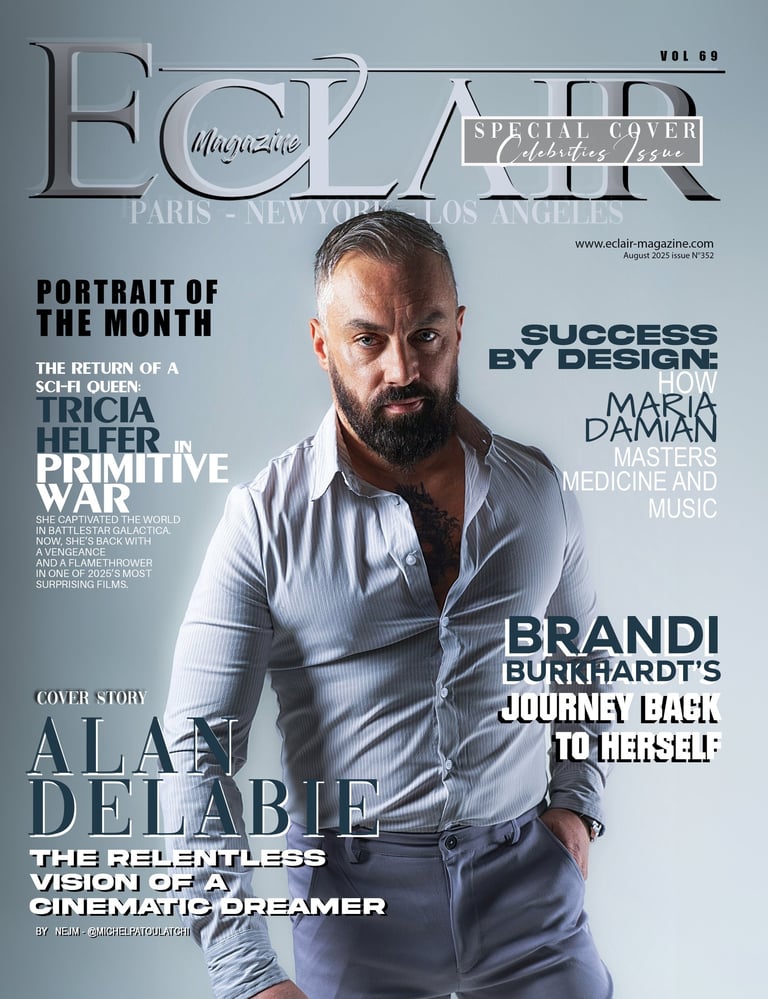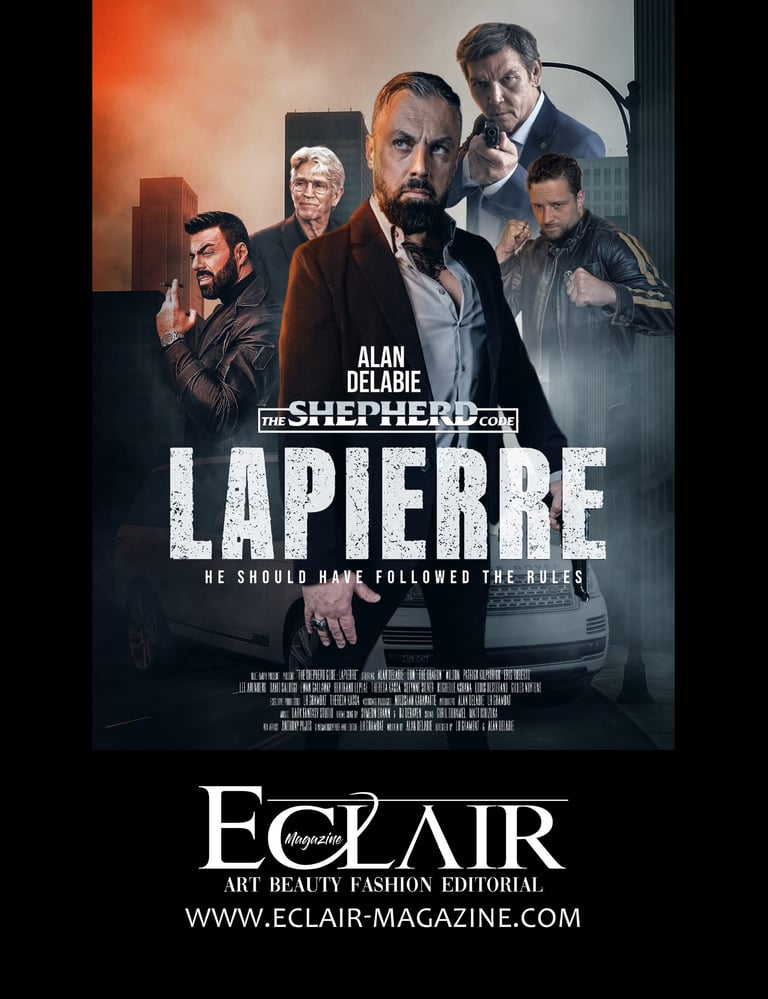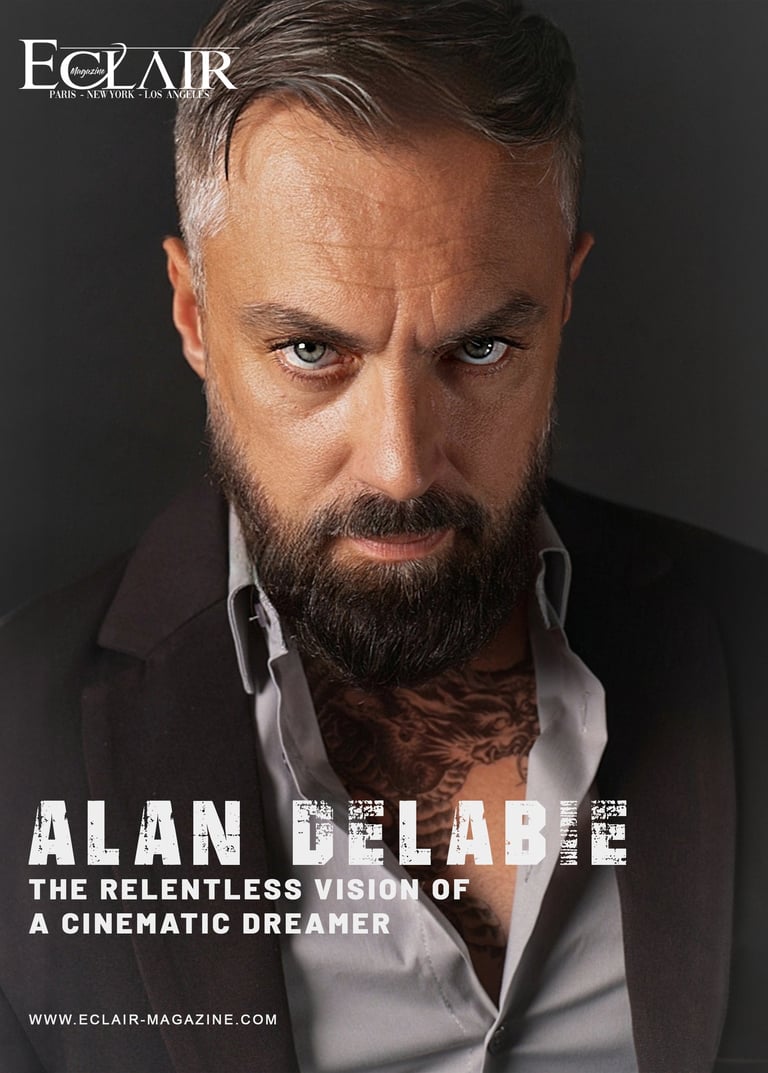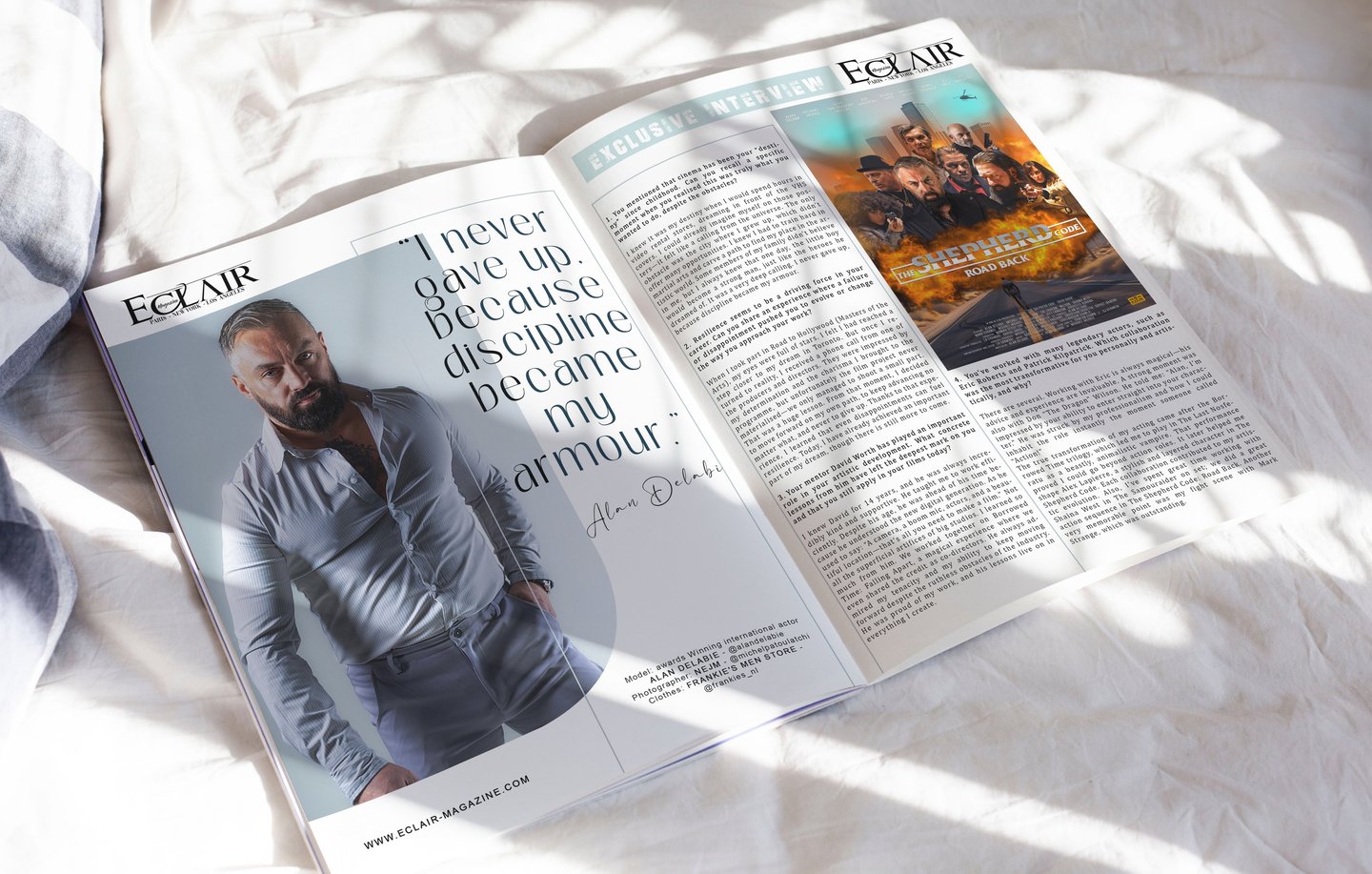EXCLUSIVE INTERVIEW
Alan Delabie: The Relentless Vision of a Cinematic Dreamer
Conducted by Guillaume Jean Lefebvre


You mentioned that cinema has been your “destiny” since childhood. Can you recall a specific moment when you realised this was truly what you wanted to do, despite the obstacles?
I knew it was my destiny when I would spend hours in video rental stores, dreaming in front of the VHS covers. I could already imagine myself on those posters—it felt like a calling from the universe. The only obstacle was the city where I grew up, which didn’t offer many opportunities. I knew I had to train hard in martial arts and carve a path to find my place in the artistic world. Some members of my family didn’t believe in me, but I always knew that one day, the little boy would become a strong man, just like the heroes he dreamed of. It was a very deep calling. I never gave up, because discipline became my armour.Resilience seems to be a driving force in your career. Can you share an experience where a failure or disappointment pushed you to evolve or change the way you approach your work?
When I took part in Road to Hollywood (Masters of the Arts), my eyes were full of stars. I felt I had reached a step closer to my dream in Toronto. But once I returned to reality, I received a phone call from one of the producers and directors. They were impressed by my determination and the charisma I brought to the programme, but unfortunately the film project never materialised—we only managed to shoot a small part. That was a huge lesson. From that moment, I decided to move forward on my own path, to keep advancing no matter what, and never to give up. Thanks to that experience, I learned that even disappointments can fuel resilience. Today, I have already achieved an important part of my dream, though there is still more to come.
3. Your mentor David Worth has played an important role in your artistic development. What concrete lessons from him have left the deepest mark on you and that you still apply in your films today?
I knew David for 14 years, and he was always incredibly kind and supportive. He taught me to work efficiently. Despite his age, he was ahead of his time because he understood the new digital generation. As he used to say: “A camera, a boom mic, actors, and a beautiful location—that’s all you need to make a film.” Not all the superficial artifices of big studios. I learned so much from him. We worked together on Borrowed Time: Falling Apart, a magical experience where we even shared the credit as co-directors. He always admired my tenacity and my ability to keep moving forward despite the ruthless obstacles of the industry. He was proud of my work, and his lessons live on in everything I create.
Born in the north of France and raised in Lille, Alan Delabie has always carried within him the restless fire of the seventh art. As a child, he would lose himself in VHS tapes of American action and horror films, mesmerized by the intensity of Bruce Lee, Chuck Norris, Clint Eastwood, and the chilling atmosphere of Halloween or An American Werewolf in London. He would write stories in which he was always the protagonist, a young boy imagining his destiny on the screen. That sense of inevitability—of cinema as fate—never left him.
At just ten years old, he began martial arts, a discipline that not only honed his body but forged the resilience and determination that would become his artistic backbone. Demonstrations on French
television soon gave him confidence in front of the camera, while acting lessons and countless hours of self-teaching nurtured the performer he was becoming. His career path, however, would be far from linear. Though he studied business and obtained a degree in commerce, his soul belonged to art and performance. He went on to become European champion in nunchaku and earned a black belt in karate, accomplishments that paralleled his artistic journey and underscored his relentless drive.
Over the years, Delabie carved a space for himself in the international industry. He was noticed by Canadian producer Jalal Merhi, who brought him onto Road to Hollywood. He shared the screen with Academy Award nominee Eric Roberts—not once, but three times—alongside legendary names like Lee Arenberg of Pirates of the Caribbean, Patrick Kilpatrick, Rochelle Ashana, Shaina West,”the samuraider”, Costas and Louis Mandylor, and Bob Wall, Bruce Lee’s opponent in Enter the Dragon. One of his most treasured experiences was his mentorship with David Worth, Clint Eastwood’s cinematographer and the director of Kickboxer. Worth passed down invaluable lessons in directing, lessons that still echo through Delabie’s work today.
What defines him, however, is not only the names he has worked with, but the persistence with which he has walked this winding path. The film industry is notoriously unforgiving, full of false promises and obstacles, but Delabie has never let doubt or jealousy hold him back. Resilience
became his compass. “Every artist experiences doubt,” he says, “but the lesson is never to give up.” That belief has carried him into a career decorated with international recognition—from the Actors Awards Los Angeles to the Oniros Film Awards—and into a moment that now feels like the culmination of decades of perseverance: his trilogy, The Shepherd Code.
For Delabie, this saga is more than cinema—it is the embodiment of years of growth, discipline, and artistic maturity. With The Shepherd Code: Road Back premiering in UK cinemas in September 2025, and the prequel Lapierre already acclaimed, he is living the very dream that once felt so
distant to the boy scribbling stories in Lille. The trilogy reflects not only his strength as an actor but


INTERVIEW
You’ve worked with many legendary actors, such as Eric Roberts and Patrick Kilpatrick. Which collaboration was the most transformative for you personally and artistically, and why?
There are several. Working with Eric is always magical—his advice and experience are invaluable. A strong moment was also with Don “The Dragon” Wilson. He told me: “Alan, I’m impressed by your ability to enter straight into your character.” He was struck by my professionalism and how I could inhabit the role instantly the moment someone called “Action!”
The true transformation of my acting came after the Borrowed Time trilogy, which led me to play in The Last Nosferatu as a beastly, animalistic vampire. That performance proved I could go beyond action roles. It later helped me shape Alex Lapierre, a stylish and layered character in The Shepherd Code. Each collaboration contributed to my artistic evolution. Also, I've spent great time working with Shaina West in The Samouraider on set; we did a great action sequence in The Shepherd Code: Road Back. Another very memorable point was my fight scene with Mark Strange, which was outstanding.Your passion for martial arts and action cinema started at a very young age. How have these disciplines shaped you, not only as an actor but also as a person?
Martial arts helped me stay on course—they saved me. I lost my father when I was 17, and I found refuge in this discipline, which completed my training and taught me never to let go, because letting go means dying. My father passed on that discipline to me. He used to tell me: “One day, you’ll be in the cinema like your idols.”You have received several international awards. In your opinion, what distinguishes an actor or director who stands out in the film industry today? Is it talent, discipline, or something else?
Today, you need to have many strings to your bow. If you are only an actor, the race is much harder. You must also be a director, a storyteller, someone able to create. Winning awards is already a beautiful recognition, but it also means you have to keep raising the bar—to go further, to always deliver quality and originality. Some people think it’s impossible, simply because they themselves are afraid of falling. But growth comes from risk. Talent and discipline must go hand in hand.
Your trilogy The Shepherd Code represents a major evolution in your career. What specific challenges did you face while directing and producing this series of films?
Yes, it’s been an incredible evolution. The second film, The Shepherd Code: Road Back, produced by M&M Film Production International, allowed me to go further thanks to a larger budget. I am proud of this film, which I co-directed with Michael Morris. I also want to thank LH Chambat, my old friend, who did a magnificent job with editing and cinematography. I recently finished the prequel, Lapierre, which will be released in 2026—a dramatic action film with a touch of melancholy. This saga is a true masterclass, and I cannot wait to create one last opus with an even bigger budget. The Shepherd Code: Road Back will premiere mid-September in Showcase Cinemas across the UK, before being released on streaming and Blu-ray/DVD internationally.You combine cinema and fashion with your project French Male. How do these two worlds influence each other in your work and the way you express yourself?
I love fashion, and I spend a lot on clothes. That’s why I decided to create French Male, which I am developing step by step. You should never rush things. My idea is to combine cinema and fashion in a concept that reflects both worlds.If you could leave a message or a legacy for the next generation of artists, whether in cinema, fashion, or martial arts, what would it be and why?
I would like to leave behind a message: never give up. Even suffering can be transformed into strength. Love and passion are stronger than anything. Create your own signature, something unique, so that you won’t be forgotten. Even if everything eventually fades, the universe will always remember a beautiful story.What would be the next dream you would like to accomplish? And what advice would you give to young people hoping to follow your path?
I would love to act alongside Tom Cruise, Viola Davis, or Anthony Starr, and to make a big film with even greater means. To young people, I would say: don’t skip steps. Today, with the rise of social media, many influencers with millions of followers believe they are artists—but that is just an illusion. A true artist must have maturity to share, to give, to pass on a story. You must learn from those who came before, because even if the youth are the future, we must never forget where we come from.




Model : awards Winning international actor Alan Delabie - @alandelabie
Photographer : Nejm - @michelpatoulatchi
Clothes Frankie's Men Store - @frankies_nl
Quality, not quantity
We have made quality our habit. It’s not something that we just strive for – we live by this principle every day.
